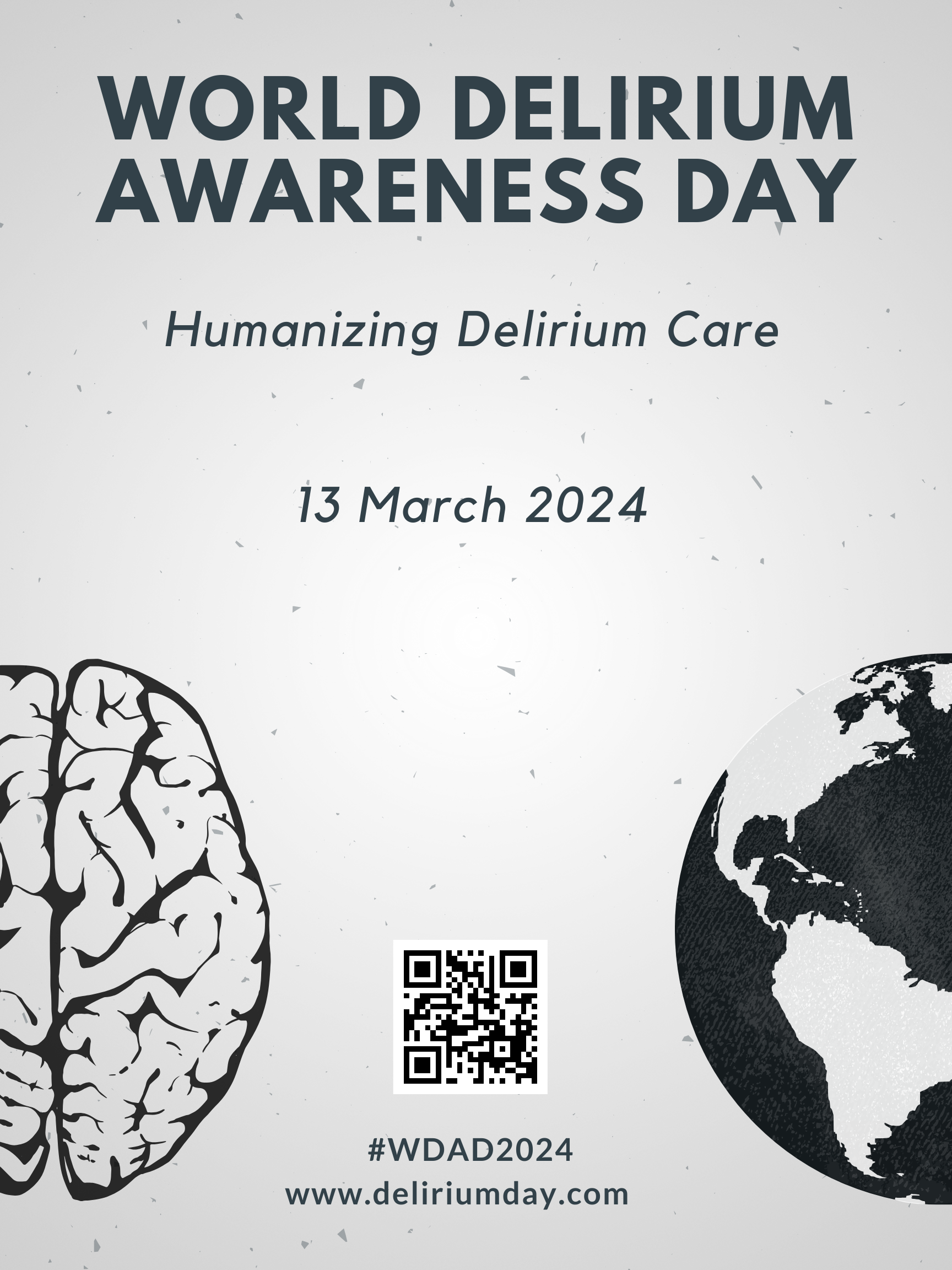World Delirium Awareness Day 2024
Wednesday, March 13, 2024
WDAD 2024 Logo
WDAD 2024 Theme
Nydahl, P., Ely, E.W. & Heras-La Calle, G. Humanizing Delirium Care. Intensive Care Med (2024). https://doi.org/10.1007/s00134-024-07329-3
WDAD 2024 Posters
WDAD Presentation Slide
WDAD 2024 Infographic Contest Entries
Entry 1 - Delirium Toolbox and Strategies
This Infographic was created as part of a quality improvement project called "Delirium Toolboxes" at Monash Health Kingston Centre which saw the creation of boxes equipped with non-pharmacological resources (games, puzzles, sensory activities, colouring and communication tools like the Sunflower tool to help engage patients with cognitive impairment. We will be entering the second page of the pdf, the infographic named "Delirium Managment Strategies" to the competition.
Authors: Amanda Savoie, Liqi Wang and Danielle Byrne.
Health Network: Monash Health
Country: Australia
Entry 2 - Delirium information for healthcare staff
Author: Sofy Putruele
Organization: Comité de Analgesia, Delirium y Sedación.
https://fepimcti-sedacion.webnode.page/
Language: Spanish
Entry 3 - Think Delirium V1 & Entry 4 - Think Delirium V2
Author: Stephanie Fuentes Wellstead
Organization: Royal Cornwall Hospital Trust | NHS
Think delirium poster 1 - is a poster designed to raise awareness of delirium for carers, family, relatives and visitors who may be visiting a loved one. To empower them to advocate for their loved one and raise concerns if there is potential signs of delirium.
Think delirium poster 2 - is a poster designed for staff to aid in a visual prompt for earlier recognition of delirium and causes by utilising the SQiD question and the PINCHME mnemonic.
Author: Lachlan Couper
Entry 6 - WDAD (Polish) / Entry 6 (English)
Authors: Sylwia Tomasiczek, Weronika Tomasiczek, Alicja Hojda, Olga Plinta with illustrations by M. Łysakiewicz.
Author: C.J. Cabilan
Organization: Canberra Health Services, Australia
SPECIAL: A mnemonic for non-pharmacological interventions to reduce challenging or responsive behaviours in people with delirium.
The inspiration for the SPECIAL is the use of one-on-one ‘special’ or sitters in acute settings to manage delirium. It is understood that the evidence for the use of ‘specials’ is weak. It is also increasingly acknowledged that we use a least prepared and unregulated workforce to support people with delirium, which puts staff and patients at risk.
I am hoping that using the SPECIAL mnemonic steers us away from custodial ‘specials’ towards standard non-pharmacological strategies to support people with delirium to reduce challenging or responsive behaviours.
Author: Lakeshia Benn
Entry 9 - Sindrome Confusional Agudo - Delirium (English version)
Author: Isabel del Cañizo Lázaro, @pedrusquita
The aim of the poster is to educate patients' families about delirium in a hospital setting.
Available for free download.
Author: Henry Brookshaw
Entry 11 - Begins with awareness
Author: Gizem Ertürk, Istanbul
Entry 12- Preventing Delirium with Nutrition
Author: Gilma Johnston
Organization: Eagle Ridge Hospital in Port Moody, British Columbia, Canada.
What could our patient outcomes be if our patients received adequate nutrition from day 1 of admission”?
A quality improvement desire from a community hospital in British Columbia, Canada, to reduce LOS, malnutrition related delirium, pneumonia, sepsis and hospital acquired UTI’s.
Eagle Ridge Hospital launched an oral nutrition supplement (ONS) project on February 14th, 2023 starting in the Emergency Room. Quality initiative focus: AIM for 60% of patients that meet the criteria receive ONS by day 1 of admission by July 2023 at ERH ER.
Addressing nutrition in the first 48 hours of admission has shown to reduce length of stay by 2 – 3 days, reduces the risk of nutrition related delirium, morbidity of infections, delayed ambulation, and affects length of stay. This work has now spread to our in-patient units with the site adopting an appreciation for a Food is Medicine approach to patients health.
Authors: Julia Hadley, Anna Batho and Polly Fitch
Organization: Delirium Team at the Royal London Hospital.
Authors: Terri Bowser
Authors: Cintia Hernadez
Organization: Unidad de Psiquiatría de Enlace, Psicología de la Salud y Medicina Psicosomática
In honor of World Delirium Awareness Day, celebrated on March 13, we are pleased to share with you a our infographic focused on delirium management tailored to family members and caregivers.
Our infographic has been designed with the intention of offering concise and practical information on how to identify delirium, as well as effective strategies for its management while our patients are hospitalized.
Entry 19- Think Delirium - Call it out!
Author: Kadesha Collins-Fletcher
Organization: Care New England Health System
The infographic was created as part of a clinical quality improvement initiative, aiming to enhance the early identification of delirium by integrating the SQiD.
Entry 20- Think Delirium - 4M’s
Author: Dr Hanadi and Team Qatar
Organization: WHO Collaboration Centre for Healthy Ageing and Dementia, Qatar


























